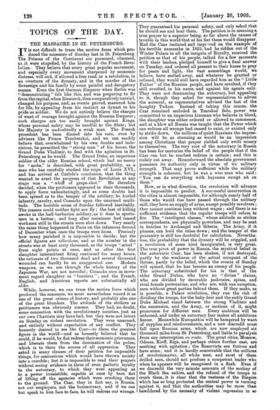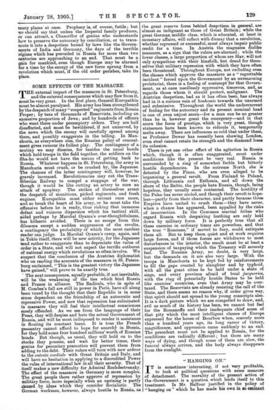TOPICS OF THE DAY.
THE MASSACRE IN ST. PETERSBURG.
IT is not difficult to trace the motive force which pro- duced the massacre of Sunday last in St. Petersburg. The Princes of the Continent are possessed, obsessed, as,it were stupefied, by the history of the French Revo- lution. They believe that every great popular movement, and especially every movement sharpened by economic distress, will end, if allowed a free road, in a revolution, in an overturn of the dynasty, and in the murder of the Sovereign and his family by some painful and derogatory means. Even the first German Emperor when Berlin was " demonstrating " felt like this, and was preparing to fly from the capital, when Bismarck, then comparatively untried, changed his purpose, and, as events proved, mastered him for, life, by appealing from his instinct as dynast to his pride as soldier. We do not entirely believe the charges of want of courage brought against the Russian Emperor ; such charges are too easily brought against Kings, whose personal safety may be needful to the State ; but his Majesty is undoubtedly a weak man. The French precedent has been dinned into his ears, even by advisers like Prince Troubetzkoi, and we can readily believe that, overwhelmed by his own doubts and inde- cisions, he permitted the " strong man " of his house, the Grand Duke Vladimir, to deal with the agitation in St. Petersburg as he would. The Grand Duke, an imperious soldier of the older Russian school, which had no mercy for " mobs," is described, with great probability, as a man who has carefully studied the reign of Louis XVI.; and has arrived at Carlyle's conclusion, that the thing wanted to avert the progress of that Revolution at any stage was a " whiff of grape-shot." He therefore decided, when the petitioners appeared in their thousands, to apply force unhesitatingly, and as some doubts had been spread as to the temper of the artillery; he hurled infantry, cavalry, and Cossacks upon the unarmed multi- tude. The horrible scene of Sunday followed inevitably. The masses could neither fight nor fly ; the lust of killing awoke in the half-barbarian soldiery, as it does in sports- men in a battue ; and long after resistance had ceased workmen still in the streets were shot down Very nearly the same thing happened in Paris on the infamous Second of December when once the troops were loose. Precisely how many perished it is impossible to decide; but the official figures are ridiculous, and as the number in the streets was at least sixty thousand, as the troops " acted " from eight points at once, and as after the first slaughter intermittent firing continued for many hours, the estimate of two thousand dead and several thousand wounded can hardly be an exaggerated one. Modern weapons, as we see through the whole history of the Japanese War, are not merciful ; Cossacks once in move- ment regard slaughter as " business " ; and the French, English, and American reports are substautially all alike.
While, however, we can trace the motive force which produced the massacre, we must nevertheless record it as one of the great crimes of history, and probably also one of the great blunders. The attitude of the strikers as petitioners was obviously sincere. They had, no doubt, some connection with the revolutionary societies, just as our own Chartists may have had, but they were not intent on Sunday on violent revolution. They were unarmed, and entirely without expectation of any conflict. They honestly desired to see the Czar—to them the greatest figure in the world—and as honestly believed that he could, if he would, by fiat redress their economic grievances, and liberate them from the domination of the police, which is to them the source of all oppression. They asked in many clauses of their petition for impossible things, for concessions which would have thrown society into a crucible ; but it is impossible to read their prayers without seeing evidence in them of even pathetic loyalty to the autocracy, to which they. were appealing as to a power irresistible, capable at once by bare fiat of lifting off the agencies which were crushing them to the ground. The Czar, they in fact say, is Russia, not our employers, not the bureaucracy, and if we can but speak to him face to face, he will redress our wrongs.
They guaranteed his personal safety, and only asked that he should see and hear them. The petition is in meaning a
true prayer to a superior being, so far above the causes of trouble in this world that at his fiat these would disappear. Had the Czar imitated and improved on the example of his terrible namesake in 1825, had he ridden out of the Winter Palace in all the insignia of Royalty, received the petition as that of his people, talked for a few moments
with their leaders, pledged himself to give a final answer
on Tuesday, and ordered all present to their knees to pray for peace and light, the vast assemblage would, we believe, have melted away, and whatever he granted or refused, they would still have regarded him as the " Little Father " of the Russian people, and have revolted, if they still revolted, in his name, and against his agents only. They were not denouncing the autocracy, but appealing to it, though they asked for representatives to advise the autocrat, as representatives advised the last of the haughty Tudors. Instead of taking this course, the Czar remained secluded in Tsarskoe Selo, power was committed to an imperious kinsman who believes in blood, the slaughter was either ordered or allowed to commence, and at a blow all Russia was taught that the Power which can redress all wrongs had ceased to exist, or existed only to strike down. On millions of quiet Russians the impres- sion will be as stunning as would be an impression among Christians that prayer yielded only swift misery to themselves. The very root of the autocracy in Russia has been for centuries the belief of the people that if the Czar can but be reached redress is certain ; and this is rudely cut away. Henceforward the absolute government possesses its authority only in virtue of its military strength. That may prove sufficient while the military strength is coherent, but he was a wise man who said : "You can do everything with bayonets except sit on them."
How, or in what direction, the revolution will advance it is impossible to predict. A successful insurrection in the cities is almost impossible, for although nearly half of those who would rise have passed through the military mill, they have no supply of arms, except possibly revolvers ; they cannot continue long without wages ; and there is no sufficient evidence that the regular troops will refuse. to fire. The " intelligent classes," whose attitude so strikes correspondents, are physically. powerless, and may be sent in batches to Archangel and Siberia. The Army, if it pleases, can hold the cities down ; and the temper of the peasantry is still too doubtful for calculation. Neverthe- less, the probability that the dynasty will be crippled, and a revolution of some kind inaugurated, is very great. The true pivot of power in Russia, the mystical belief in the autocratic Czar, has been shaken, if not destroyed, partly by the weakness of the actual occupant of the throne, partly by the belief, which the events of Sunday will spread, that he has become an enemy of his people. The autocracy substituted for his is that of the elder Grand Dukes, who have no " divine " claims, who are divided by incurable jealousies, spites, and rival female pretensions, and who are, with one exception, men without great parties behind them. If they make, as is possible, a, Palace revolution, they run the risk of dividing the troops, for the baby-heir and the sickly Grand Duke Michael stand between the strong Vladimir and the succession, and the Army, or sections of it, might pronounce for different men. Every ambition will be unloosed, and under an autocracy fear makes all ambitions fiercer. Meanwhile Kuropatkin will be hampered by want of supplies and reinforcements, and a new discredit must fall upon Russian arms, which are now employed six thousand miles from St. Petersburg, and liable to paralysis from any interruption en route. The great cities, Moscow, Odessa, Kieff, Riga, and perhaps others further east, are seething with agitation ; the Reservists are furious and have arms ; and it is hardly conceivable that the millions of revolutionaries, all white men, and most of them drilled men, should not produce a competent leader who when he appears will be recognised in a flash. Even if we discredit the very minute accounts of the mutiny of the Black Sea sailors, and the refusal of the troops to crush them, it is clear that the vastness of the Empire which has so long protected the central power is turning against it, and that the authorities may be more than bewildered by the necessity of violent repression in so many places at once. Prophecy is, of course, futile ; but we should say that unless the Imperial family produces, or can attract, a Chancellor of genius, who understands how to preserve the autocracy by conciliation, or to trans- mute it into a despotism bound by laws like the Govern- ments of India and Germany, the days of the terrible regime which has prevailed in Russia for more than two centuries are approaching to an end. That must be a gain for mankind, even though Europe may be alarmed for a time by the energy of the new force sprung from a revolution which must, if the old order perishes, take its place.























































 Previous page
Previous page